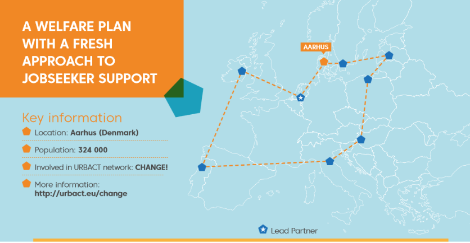Aarhus (DK) - A welfare plan with a fresh approach to jobseeker support
2019
A new model of citizenship is starting to take shape in Aarhus. Amid intense debate about how this might look, the city’s participation in the « URBACT CHANGE! » network has been vital for experimentation.
To download : urbact-citystories-aarhus.pdf (1.7 MiB)

The power of trust
Before joining URBACT, Aarhus experimented a new project to reframe the municipality’s relationship with longterm jobseekers. ‘Long term unemployed take the lead’ project was tested by almost 100 individuals allocated EUR 6 700 each to help them in their job-hunting process. Unlike the existing system, the beneficiaries were free to spend the funds in whatever way they considered useful. “It was a very strange experience,” admits Anne Marie Frederiksen, a Municipal Consultant and one of the designers of the initiative.By joining URBACT, her team made use of cities’ and experts’ knowledge within the « CHANGE! » network. “Eindhoven (NL) were helpful in training us on how to better deal with people on a personal level and we benefited a great deal from staff exchanges with them. As a result our job consultants became less like managers more like sparring partners. They were primarily there to give advice and inspire.”A full evaluation is still underway but early results are encouraging. Of the 97 beneficiaries, 32 are now out of the benefits system and several individuals have found stable employment. One of the most surprising findings for Ms Frederiksen and her team was the number of beneficiaries who used the funds to kickstart their own businesses, “as people in the public sector, we were not expecting this, lots of people used the money to fulfil dreams they’d had for a long time. We’ve got people in fashion, tech, baking, and car repair among other things.”Given the potential impact for both the local economy and individuals within it, the initiative was recognised as an URBACT Good Practice in 2017. It is now being considered as a model to be scaled up within Denmark, and has attracted much discussion in the « CHANGE! » network.
Following this experience and discussions within the Network, the City of Aarhus and its local group of stakeholders (URBACT Local Group) designed an Integrated Action Plan for public services. Organised at grass roots level, these were ‘The Warm Welcome Society’, an orientation programme for new arrivals to the city; the ‘Rethink Activism Festival’, run by Paul Natorp, a local activist and social entrepreneur, which gave visibility to actors like those at ‘The Institut for X’. If the URBACT Local Group was a bridge across the city’s divisions, this framework ensured these potentially disparate activities were united as part of the same ambition towards collaborative citizenship. “In our URBACT Local Group we managed to go from words to action,” reflects Torben Glock, a Citizens’ Services Special Consultant for the municipality, and co-ordinator of the URBACT Local Group. “Based on the success of initiatives like these I think we’re ready to take even more risks.”
Working across silos thanks to URBACT
“This was one of the reasons we became involved in the CHANGE! network, as a meeting place for people usually confined to different worlds. Municipality and citizens are each other’s prerequisites in the development of our city,” says Torben Glock. Paul Natorp had similar motivations when he joined the network. He says, “We have so many interactions with different parts of the municipality but we need a more global vision. Different positions have to be unified if we are to build an ecosystem of co-creation.” Designing an Integrated Action Plan for the city services amidst such a diverse local group was one concrete step in enacting this philosophy. “For Aarhus this was particularly clear,” says Ferenc Szigeti-Böröcz, Lead Expert of the « CHANGE! » network. “More than any other of the partner cities, they used the collaborative framework as a way of structuring their work.”